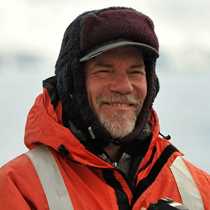At Sea
Why travel to Antarctica? Once here, walking in the footsteps of explorers, surrounded by astounding vistas of otherworldly beauty and face to face with antic, comic and remarkable wildlife, the reasons seem manifest. But many of us have heard the question before we set out and will certainly hear it again in conversation about our adventures. Although our motivations may well be as clear and solid as glacial ice in our own minds, they are not always easy to communicate to our friends and families. Hence, perhaps, they are worthy of a moment’s reflection.
It seems likely that ever since humans first settled in villages at the dawn of agriculture and civilization, some few have chosen a less sedentary existence and remained wanderers. But the reasons for a peripatetic lifestyle have evolved considerably over the millennia. At first, and for many thousands of years, the primary motivation for travel was commerce. Difficult and dangerous, journeys through the wilderness from one settled place to another were an opportunity to profit by providing and exchanging rare or important commodities. Marco Polo, Zheng He, Magellan, many of the world’s most famous travelers and explorers were motivated largely or purely by commerce. Religious pilgrimage provided another powerful incentive for wanderings and was at least the ostensible reason for the incredible journeys of Ibn Butatta, perhaps the greatest of all early travelers.
By the 18th Century or so, as the Enlightenment gained force in Europe and blank spots began to disappear from the map, scientific exploration slowly gained currency. Captain Cook, Lewis and Clark, and the voyage of the HMS Challenger were early stirrings of a new style of travel, which led to the heroic age of exploration and men like Amundsen, Nansen and Hillary who traveled purely to encounter new places, to learn and to accomplish that which had not been done before.
Around this same time, another new reason to travel was born: recreation. Since Ibn Butatta in the 14th Century, and likely long before, travel writing had been a popular genre and many people enjoyed armchair journeys, but some time in the 19th Century, taking advantage of steamships, trains and other advances in travel technology, the Victorians started going places for fun. What a remarkable concept: that ordinary people could leave their homes and travel to foreign places, even travel to, rather than through, the wilderness. Once begun though, recreational travel has grown with unstoppable force. It seems that the reasons spring from within us, nearly all of us, and if we can go, we will.
So, in the end, the reasons to travel to Antarctica are as individual as each of us. It may be to see and photograph the wilderness of ice; it may to encounter unusual and amazing wildlife; or it may be simply to be there, to feel the wind, hike across the snow and squint into the Antarctic sun for yourself.
Why travel to Antarctica? Once here, walking in the footsteps of explorers, surrounded by astounding vistas of otherworldly beauty and face to face with antic, comic and remarkable wildlife, the reasons seem manifest. But many of us have heard the question before we set out and will certainly hear it again in conversation about our adventures. Although our motivations may well be as clear and solid as glacial ice in our own minds, they are not always easy to communicate to our friends and families. Hence, perhaps, they are worthy of a moment’s reflection.
It seems likely that ever since humans first settled in villages at the dawn of agriculture and civilization, some few have chosen a less sedentary existence and remained wanderers. But the reasons for a peripatetic lifestyle have evolved considerably over the millennia. At first, and for many thousands of years, the primary motivation for travel was commerce. Difficult and dangerous, journeys through the wilderness from one settled place to another were an opportunity to profit by providing and exchanging rare or important commodities. Marco Polo, Zheng He, Magellan, many of the world’s most famous travelers and explorers were motivated largely or purely by commerce. Religious pilgrimage provided another powerful incentive for wanderings and was at least the ostensible reason for the incredible journeys of Ibn Butatta, perhaps the greatest of all early travelers.
By the 18th Century or so, as the Enlightenment gained force in Europe and blank spots began to disappear from the map, scientific exploration slowly gained currency. Captain Cook, Lewis and Clark, and the voyage of the HMS Challenger were early stirrings of a new style of travel, which led to the heroic age of exploration and men like Amundsen, Nansen and Hillary who traveled purely to encounter new places, to learn and to accomplish that which had not been done before.
Around this same time, another new reason to travel was born: recreation. Since Ibn Butatta in the 14th Century, and likely long before, travel writing had been a popular genre and many people enjoyed armchair journeys, but some time in the 19th Century, taking advantage of steamships, trains and other advances in travel technology, the Victorians started going places for fun. What a remarkable concept: that ordinary people could leave their homes and travel to foreign places, even travel to, rather than through, the wilderness. Once begun though, recreational travel has grown with unstoppable force. It seems that the reasons spring from within us, nearly all of us, and if we can go, we will.
So, in the end, the reasons to travel to Antarctica are as individual as each of us. It may be to see and photograph the wilderness of ice; it may to encounter unusual and amazing wildlife; or it may be simply to be there, to feel the wind, hike across the snow and squint into the Antarctic sun for yourself.




